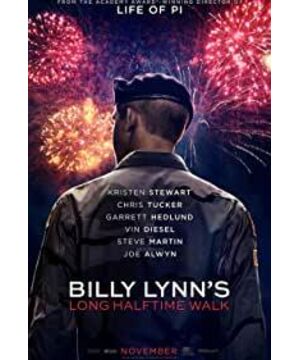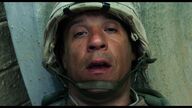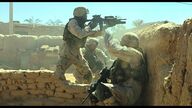- Ang Lee's "Billy Lynn's Halftime Battle"
We write articles and film reviews because we have something we want to express in our hearts.
The director made a movie because he felt it.
There are various ways of expression, all without departing from the core of "expressing oneself".
We go to the movies to get a glimpse of the director's thoughts and emotions, and to express our feelings through the pen of others.
That's why I usually watch good movies at least twice.
"Billy Lynn's Midfield War" is worth three or more hits by my standards.
After reviewing the movie three times in November, I felt that the things that were pressed by watching the movie could be sorted out and recorded in words.
Another example is always the idea, whether watching a movie or reading a book is a very personal experience. Good works can stimulate the emotions and thoughts of the audience or readers, and interpret the work at hand according to each person's experience and experience. Although this interpretation, like Billy's least favorite "understanding" in the film, has nothing to do with him at all but only with the reader or the audience themselves.
This is not the case. People are lonely after all, what we seek is the resonance that seems to be a certain moment in the spirit.
Back to movies.
First impression: This is a stream-of-consciousness movie. Ang Lee has made one of the most fascinated, moving, and most complete stream-of-consciousness films I've ever seen.
Ang Lee uses technology as a guise to amplify the inner world of the character, which not only conforms to the writing style of the original novel, but also achieves the inner tangle of telling a story of a teenager's growth with film language and techniques. Of course, Ang Lee uses such a small person to examine the times and American society and the characters in it, which is his consistent practice. The film is detailed and layered, and even without considering the technical background as a promotional point, it is still a first-class work.
Back to the story itself, whether it's a novel or a movie, it's all from Billy's inner perspective, everything he sees and feels from his eyes. A 19-year-old Texas teenager, although smart, refused to study hard in school. He committed another crime before graduating from high school. He had to join the army and was "exiled" to the Iraqi battlefield. One dispatch mission can train a recruit into a veteran, not to mention Billy - although he knows little about himself about war or even about the society around him, he is smart and likes to use his brains - the novel is more about the comparison. The frequency and depth of Li's thoughts are indeed different from those of ordinary soldiers - so he is contradictory and tangled.
For such a story to resonate with Billy's state of mind and emotions, at least a certain level of understanding of the US war against Iraq in 2003 is required. As a veteran fan of the HBO war trilogy and a deep pit holder, I already have the knowledge reserve of "Generation Kill". The characters are so vivid that eight years later I can't forget them, whether it's Lt. Nate Fick, Brad Colbert "Iceman", Ray-Ray Person, Tony Espera "The Philosopher", or Rudy Reyes "The Real Recon" , and even those so-called negative characters such as the "Godfather" commander, the "primitive" company commander and the "Captain America" three-platoon commander, just one line or one word can mobilize relevant pictures and records. The imprint is so deep, the feelings will not be far away. Therefore, with a relevant understanding of the background of the war and a little understanding of the mental and emotional state of the American soldiers who participated in the war, I easily entered Billy's thoughts, and based on this, I followed the film screen bit by bit. Tear off the veil of hypocrisy, as we incarnate Billy, feel what he feels, think what he thinks, and hurt what he hurts.
There are a few clips that left the deepest impression:
1. Billy and Mushroom discuss the meaning of war under the tree and how they should face the war.
Mushroom said: Billy, your problem is thinking too much. Don't think about it, but understand that God has arranged everything, and what we do is to do what we should do in the destiny, maintain the courage, and persevere.
Teenage Billy accepts his advice with half-a-knowing knowledge.
This is echoed throughout the film and is the theme of the book.
choose.
Billy didn't come to the battlefield by choice. But he could choose to be fearful or look at everything. For mushrooms, this is more important than anything else. For an ignorant boy like Billy, Mushroom is equal to his spiritual mentor. Otherwise, he cannot explain why Mushroom's death has such a great impact on his spiritual world, nor why the confession between Billy and Mushroom is so important at the end of the film. be the ultimate climax.
2. Billy's brainstorming on the questions at the press conference. This is a very typical contrast, and it's straightforward, but it's very effective. What the world wants to hear is a polished, false story that no one can accept. Everyone knows that what they say is only official rhetoric, but this self-deception trick is being played all over the country, and no one can break the rules. Probably this is also the first time Billy has directly faced and realized the absurdity and powerlessness of reality. He can't change this social rule, he is just an insignificant soldier, although he is respected as a "hero" - however, "hero" is a title imposed on him by the American people, and he does not want to get this title at the expense of mushrooms - - No one cares about his opinion.
This clip brings out a more profound criticism of the American market society than it seems, and probably because of this, the promotion of the entire film has been avoiding the promotion of the content of the film.
3. The "love" between the cheerleaders and Billy was "fake" from the very beginning. Her excitement about being spotted by "heroes" literally overflowed the screen. What she and Billy said behind the curtain had nothing to do with the lines in the show. Erzhi, unfortunately, the young Billy didn't understand the routine, so he plunged into it eagerly, thinking that it was his ideal confidant, and there was a great opportunity to build a family with her. So in the end, the cheerleaders said, "Escape? But you are a hero, you are going to go back to the battlefield." Billy's expression clearly showed that he was deeply hit and completely lost his luster.
Americans make heroes so they can consume them, not really care about them. It's not that the whole people are like this. Some people really care and care, but they are a minority after all. Looking at the movie, the only one who really cares is Kate, the only one in the family. The parents don't care about Billy's real mental state at all, they just feel that his family as a hero is very glorious.
Ang Lee said that the theme of the film is about the growth of a teenager, which is easily covered up by popular themes such as "anti-war" or "PTSD" in the context of the Iraq War. But looking at the criteria for his selection of actors, you can see that this movie only talks about the word "growth".
Joe Alwyn, as a newcomer to the film, did not even have any real commercial stage works. His first electrocuted work was the protagonist of director Ang Lee, which shows that he is really talented. We are not professionals, and we can't see the way out, but throughout the viewing process, his performance is both level and delicate, and he has completed the homework of expressing the director's intention quite well.
I said at the beginning that this was a stream-of-consciousness movie, so after the film review came out, many people said that the movie was not good-looking. It is estimated that the audience was misled by the propaganda and thought it was a war blockbuster. But there are only a few war scenes in the movie. At other times, you have to rely on Joe's face and eyes to express the emotions of the story. At this time, you will never be satisfied with another kind of expectation, so it is not difficult to give a bad review. Understood.
I would like to borrow what a friend on WeChat said when I was chatting with me about this movie to end this post-viewing feeling that is not a movie review:
"People need their own experience and experience, after all, we are all Billy. ·Lin, otherwise how can you empathize? When I was young, I didn’t think about why things came one by one. Of course, I didn’t need to think too much about reading when I was a child. Then I grew up and things came one by one. , How can you think about big things (so-called) when they come, just like the thing that Lynn was regarded as a hero. The
English literal translation of the half-time war is half-time, and finally you can take a breath and think about it, but this one Thinking is more intense than war.
Just walk and grow up like this.
But people who don't want to grow up too.
The days of ignorance are over.
" .
Therefore, we still have many things to think about, many books to read, and many topics to discuss.
The matter of growth, in the end, is both one's own and that of the society.
View more about Billy Lynn's Long Halftime Walk reviews











